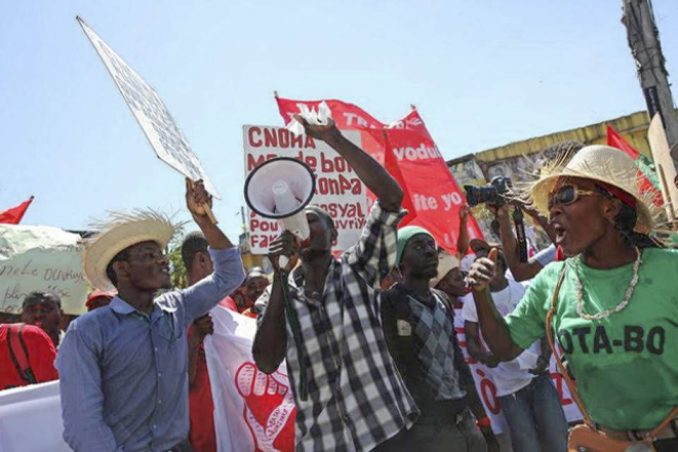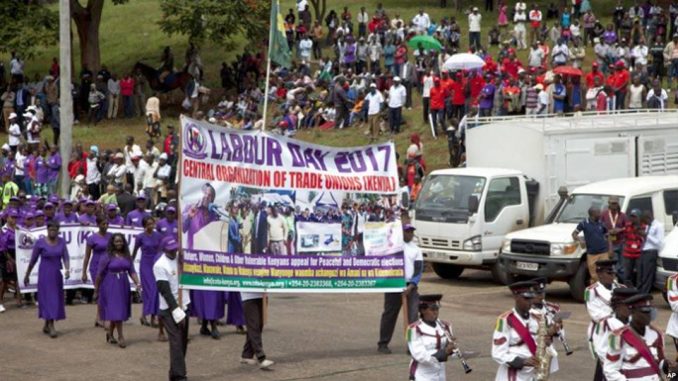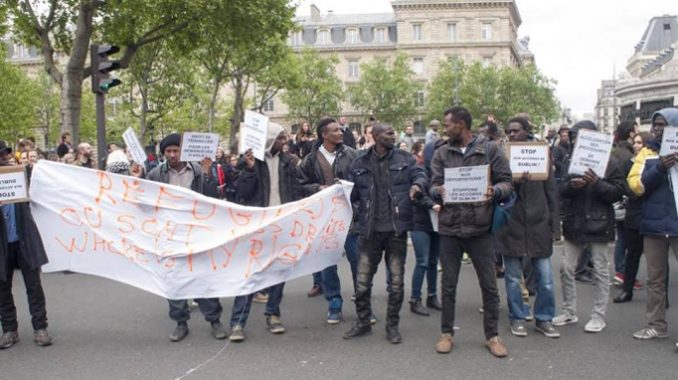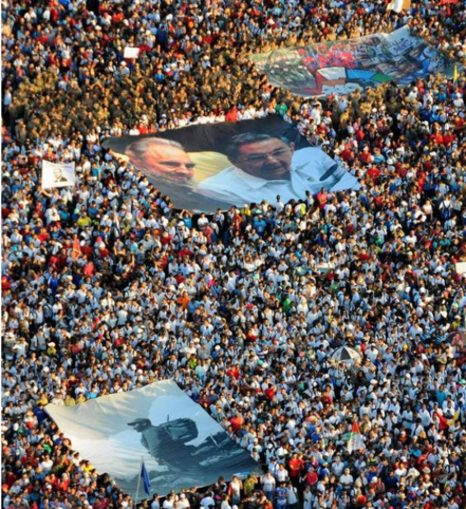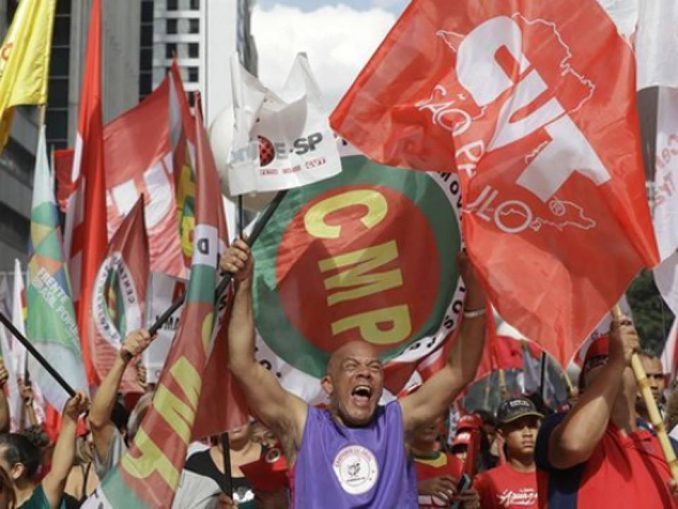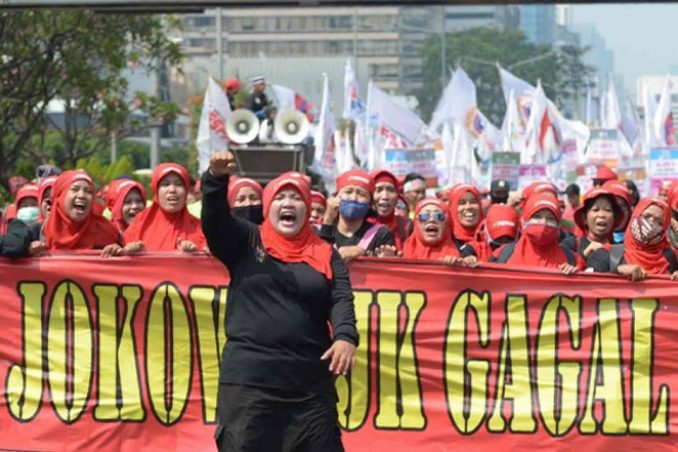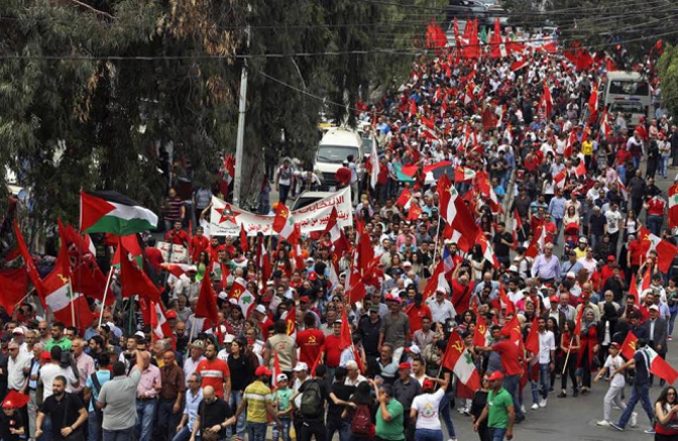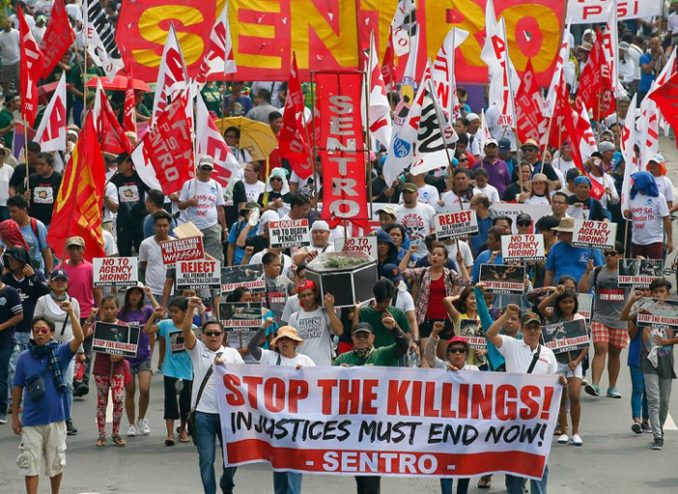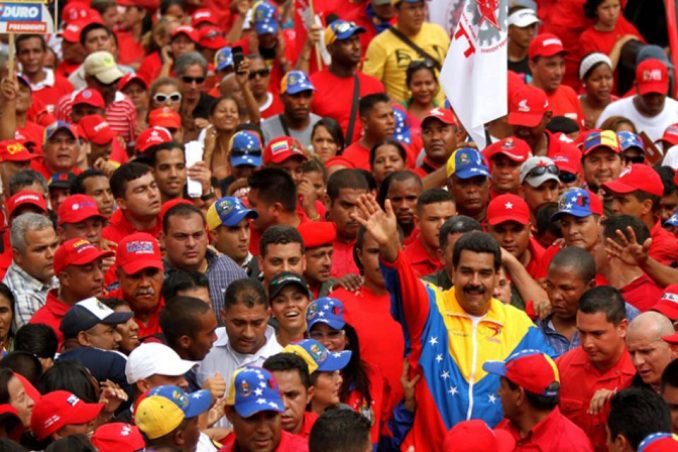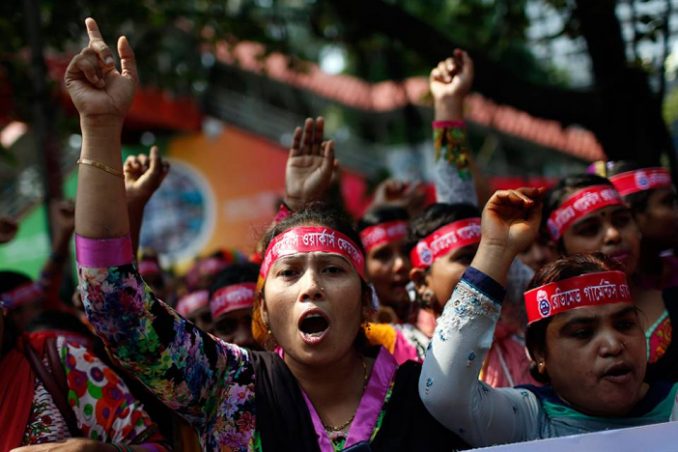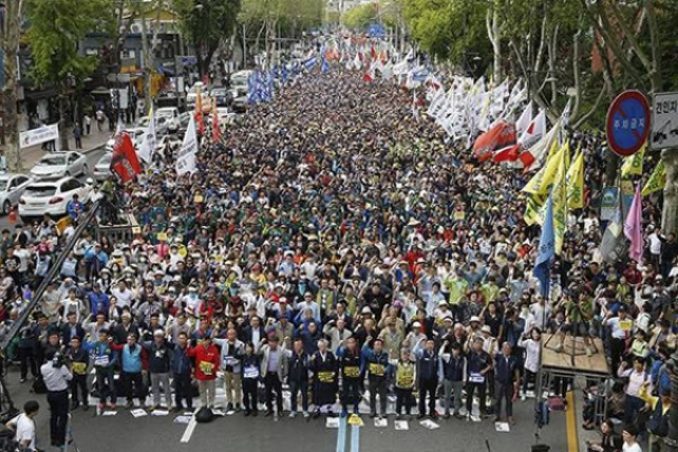May Day around the world, 2017
- Haiti
- Kenya
- France
- Cuba
- Brazil
- Indonesia
- Lebanon
- Philippines
- Venezuela
- Bangladesh
- DPRK
- Seoul, south Korea
May Day. Workers. Resistance.
May 1 is International Workers’ Day, officially commemorated in over 80 countries, but not in the United States where it originated in 1886 in Chicago as part of the struggle for the eight-hour workday. Its militant legacy is marked by strong protests by the multinational global working class. Importantly, it’s a day of solidarity.
The class struggle is alive and well as was shown by the millions of workers who took to the streets. From El Salvador to South Africa to Indonesia, workers — factory, service and farm workers, immigrants, women, youth, retirees and socialists — poured into the streets to assert their demands, show their strength and commemorate this historic day. Here are some highlights.
Masses support Maduro
A massive outpouring of Venezuelans turned out in Caracas to show support for President Nicolás Maduro and celebrate advances made by the government. To celebrate May Day, Maduro raised the minimum wage by 60 percent.
In an article titled “Caracas May Day, the march the media did not report,” eyewitness Jorge Martin wrote, “Hundreds of thousands marched in Caracas in defense of workers’ rights and the Bolivarian revolution.” Workers from different factories and workplaces carried their own banners; red shirts and hats were everywhere. Chants and music permeated the crowds who came from several rally sites. Bolivar Avenue was packed with a mile-long gathering of workers and poor people. (tinyurl.com/jw3kln9)
This enormous march overshadowed U.S.-backed, right-wing opposition forces. Washington seeks the ouster of Maduro and the Bolivarian Revolution.
In Sao Paolo and Rio de Janeiro, Brazil, mass demonstrations protested President Michael Temer’s coup government and his anti-worker, anti-poor, austerity measures. Signs read, “Resistir!” (Resist).
Workers also marched for their rights in El Salvador, Mexico, Bolivia, Colombia, Chile and other Latin American countries. Protesters in Tegucigalpa denounced the right-wing, U.S.-backed government of Honduran President Juan Orlando Ordonez and demanded better economic and social conditions.
General strike rocks San Juan
The biggest demonstration since 2006 took place in Puerto Rico. The one-day general strike shut down the bus system and schools and closed businesses. The unity of many organizations, including labor unions, was key to the strike’s success.
Thousands stopped work, blocked roads and marched to vent their rage over the 10-year economic crisis and new austerity measures. The colonial regime plans to cut public and private sector workers’ benefits, close 184 schools, undermine health care and social security, raise taxes and water fees, and privatize government operations. The masses said a loud “NO” to all these attacks on workers, students and poor people.
Led by women, students, labor unionists and other groupings, thousands marched on the “Golden Mile,” San Juan’s financial district where the U.S. Congress-appointed Fiscal Control Board is headquartered. They denounced this “junta” and U.S. colonialism, and demanded an audit to find those responsible for the $70 billion debt. The bondholders’ restructuring of Puerto Rico’s economy has devastated the country and the people have suffered. But the masses showed their anger and their power on May Day.
In Haiti, workers rallied for better working conditions in the capital city of Port-au-Prince. They chanted anti-government slogans outside an industrial park.
Fidel and Che Presente!
Some 50,000 Cuban youth led the parade of workers in Havana to celebrate May Day, which was presided over by the socialist country’s President Raul Castro. The day was dedicated to young people, who are the country’s future.
Across the island, 6 million of Cuba’s 11 million people joined in rallies to celebrate the Revolution’s advances and eagerly showed their willingness to build their society. They paid tribute to the Revolution’s late leader, Comandante Fidel Castro, and revolutionary Che Guevara whose photographs were everywhere.
All were united in defense of their nation’s sovereignty and in the demand to end the U.S. economic blockade of their country and for the return of Guantanamo Naval Base. Marchers expressed solidarity with their Venezuelan sisters and brothers in the face of U.S. hostility.
Solidarity with migrant workers; no deportations!
Tens of thousands took to the streets of Paris and other cities in France. Various groupings protested racism, capitalism, police brutality, Islamophobia and the far right National Front. Labor unionists called for workers’ rights and social equality.
Migrant workers, mainly from sub-Saharan Africa, called for an end to deportations. Pro-Palestinian groups and Marxist parties from Turkey, as well as CFDT union members, carried banners.
Demonstrations were held in 73 cities in Spain under the banner of “No excuses, into the streets,” led by labor unions UGT and CC.OO. Chants called for stable jobs, higher wages, improved pensions, social security and a rollback of anti-worker “labor reforms.” Thousands turned out in Madrid and Barcelona, with other protests in Seville, Valencia and elsewhere.
The CGTP-IN union was the main organizer of tens of thousands of workers marching in Lisbon, Portugal, under the slogan, “Value work and workers.”
Greece’s labor unions held a 24-hour general strike to protest government plans for more austerity measures demanded by global financial institutions. Thousands rallied outside the Parliament in Athens and in other cities. GSEE, the country’s largest labor union, announced a general strike for May 17 against further cutbacks.
The All Poland Alliance of Trade Unions and leftist forces organized a demonstration in Warsaw against the right-wing government.
Communists carried red flags emblazoned with hammers and sickles at marches of several thousand people in Moscow and St. Petersburg, Russia.
Labor unions organized marches in Istanbul and Ankara, Turkey. The Communist Party of Turkey held large demonstrations in four cities. Police detained 165 people in Istanbul who attempted to defy a three-year ban on May Day demonstrations in historic Taksim Square. All forces denounced the repressive government of President Recep Tayyip Erdoğan, who recently maneuvered to expand his powers.
Support BDS Campaign!
Thousands of members and supporters of the Lebanese Communist Party chanted pro-worker slogans and carried banners and flags as they marched through Beirut’s streets. The Popular Front for the Liberation of Palestine also came out on May Day, carrying Palestinian flags.
A statement by the Palestinian Trade Union Coalition for Boycott, Divestment and Sanctions began: “On May Day we Palestinian trade unions are proud to stand with the trade union movement internationally as we collectively resist attacks on our working conditions, cuts to public services and job losses.” We support rallies “uniting trade unions, immigrants and refugees, social movements, and environmentalists fighting for a better future.”
The statement emphasizes that Palestinian workers daily endure and resist “Israel’s regime of occupation, settler-colonialism and apartheid,” including “Israel’s shameful prison system.” The coalition recognized labor unions’ leading role in defending Palestinians’ right to self-determination, saluted those worldwide which have implemented BDS principles, and called for more unions to join the BDS campaign. (tinyurl.com/KSK9459)
May Day in Africa
May Day rallies were held throughout the African continent. In Nairobi, Kenya, a large celebration and march were held. Former agricultural laborers have been moving to the cities to work in manufacturing and service sectors, increasing and strengthening the urban working class.
The Congress of South African Trade Unions organized rallies totaling 180,000 people throughout South Africa. Workers marched and gave lists of their demands to their employers. The newly formed South African Federation of Trade Unions turned out its members to commemorate workers’ day.
In Zimbabwe, where the president is Robert Mugabe, there were two rallies organized by labor unions, one in the capital, Harare, the other in Chinhoyi.
‘Long live the workers!’
Over 40,000 workers marched through Jakarta, Indonesia’s capital, to the Presidential Palace, chanting, “Long live the workers!” They demanded the government raise the paltry minimum wage, ban outsourcing of jobs, stop precarious (unstable, low-wage employment) contract jobs, provide free health care and improve working conditions.
About 100,000 Philippine workers, urban poor people and farm workers, led by the National Labor Center Kilusang Mayo Uno, marched through Manila to the Presidential Palace demanding a “Social Justice Package,” with a minimum living wage, free mass housing, secure jobs and an end to precarious work.
Union members confronted the U.S. Embassy in Manila, condemning U.S.-imposed policies of cheap, contract labor. Signs condemned extrajudicial killings under President Rodrigo Duterte’s “war on drugs,” while others called on him not to meet with U.S. President Trump.
Thousands of Taiwanese workers marched in Taipei for higher wages and denounced worsening pensions and working conditions.
Labor unions, garment workers and their allies marched in Dhaka and other cities in Bangladesh for higher wages, better working conditions, health care, housing, and legal and union rights. The country’s clothing factories supply multimillion-dollar U.S. and European transnational corporations.
The Democratic People’s Republic of Korea commemorated May Day with “colorful” celebrations in its capital, Pyongyang. Art, cultural and sports exhibitions were held throughout the country. This courageous socialist country deserves international solidarity in light of increasingly bellicose threats by Washington.
In Seoul, south Korea, the 10,000-strong Korean Confederation of Trade Unions contingent within a larger march called for a decent minimum wage and chanted, “Trade union rights for all!” and “Abolish precarious work!”

